Project Management Professional Development Plan and Career Ambitions
VerifiedAdded on 2021/05/30
|12
|4282
|130
Project
AI Summary
This professional development plan (PDP) outlines a project management professional's career aspirations and strategies for achieving them. The author aims to secure a senior project management position within five years and eventually become a key decision-maker. The plan details a phased approach to skills development, including obtaining the Project Management Professional (PMP) and PRINCE2 certifications, followed by an MBA and a project management certification related to IT security. The PDP emphasizes the importance of both technical project management skills and soft skills such as leadership, people management, conflict resolution, risk management, and influencing. The author provides a self-assessment of current skills and identifies areas for improvement, outlining specific actions to enhance competencies and effectiveness. The overall goal is to become a highly skilled and effective project management professional, contributing to the advancement of the field and mentoring future professionals.

PROFESSIONAL DEVELOPMENT PLAN
NAME
DATE
NAME
DATE
Paraphrase This Document
Need a fresh take? Get an instant paraphrase of this document with our AI Paraphraser
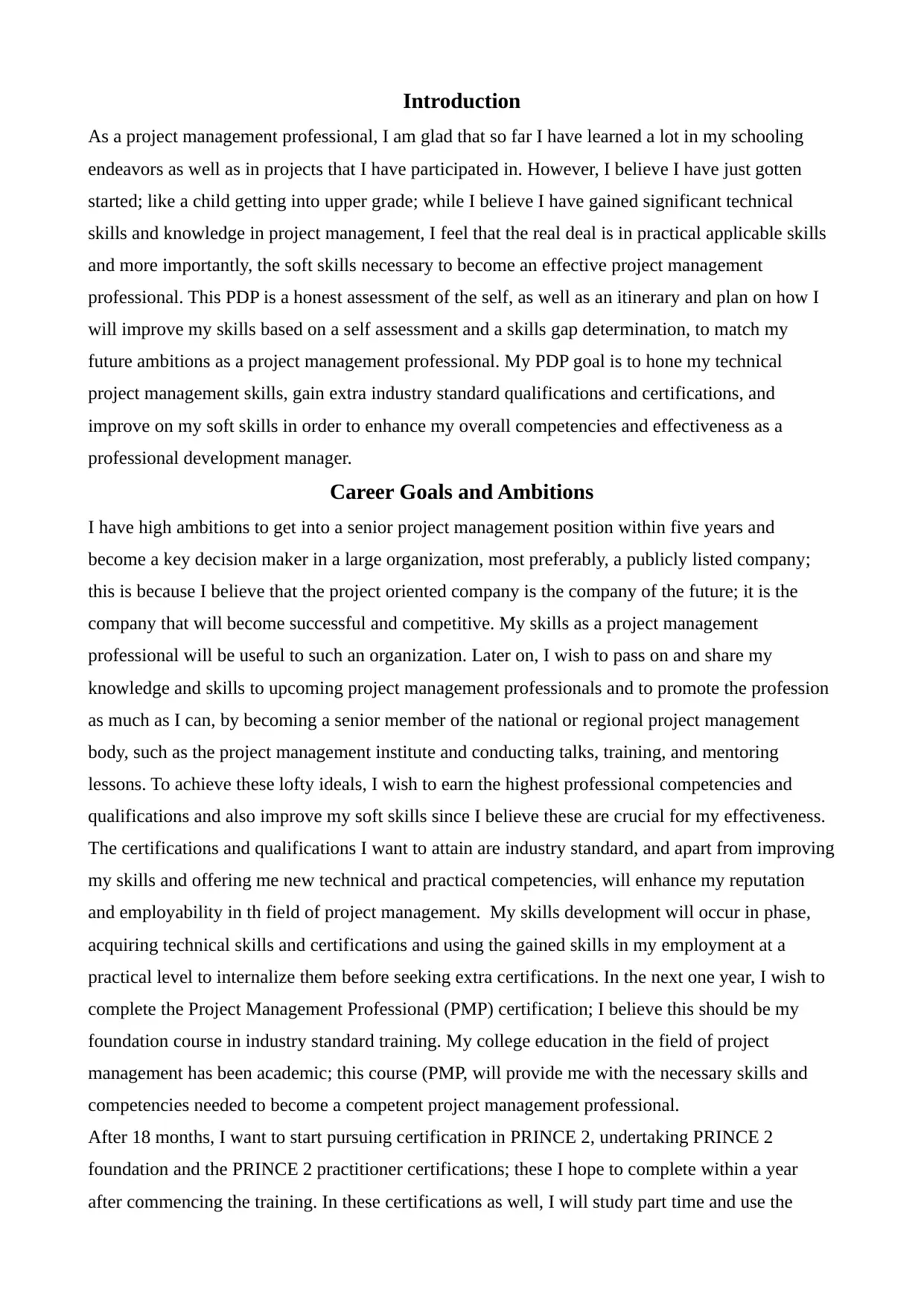
Introduction
As a project management professional, I am glad that so far I have learned a lot in my schooling
endeavors as well as in projects that I have participated in. However, I believe I have just gotten
started; like a child getting into upper grade; while I believe I have gained significant technical
skills and knowledge in project management, I feel that the real deal is in practical applicable skills
and more importantly, the soft skills necessary to become an effective project management
professional. This PDP is a honest assessment of the self, as well as an itinerary and plan on how I
will improve my skills based on a self assessment and a skills gap determination, to match my
future ambitions as a project management professional. My PDP goal is to hone my technical
project management skills, gain extra industry standard qualifications and certifications, and
improve on my soft skills in order to enhance my overall competencies and effectiveness as a
professional development manager.
Career Goals and Ambitions
I have high ambitions to get into a senior project management position within five years and
become a key decision maker in a large organization, most preferably, a publicly listed company;
this is because I believe that the project oriented company is the company of the future; it is the
company that will become successful and competitive. My skills as a project management
professional will be useful to such an organization. Later on, I wish to pass on and share my
knowledge and skills to upcoming project management professionals and to promote the profession
as much as I can, by becoming a senior member of the national or regional project management
body, such as the project management institute and conducting talks, training, and mentoring
lessons. To achieve these lofty ideals, I wish to earn the highest professional competencies and
qualifications and also improve my soft skills since I believe these are crucial for my effectiveness.
The certifications and qualifications I want to attain are industry standard, and apart from improving
my skills and offering me new technical and practical competencies, will enhance my reputation
and employability in th field of project management. My skills development will occur in phase,
acquiring technical skills and certifications and using the gained skills in my employment at a
practical level to internalize them before seeking extra certifications. In the next one year, I wish to
complete the Project Management Professional (PMP) certification; I believe this should be my
foundation course in industry standard training. My college education in the field of project
management has been academic; this course (PMP, will provide me with the necessary skills and
competencies needed to become a competent project management professional.
After 18 months, I want to start pursuing certification in PRINCE 2, undertaking PRINCE 2
foundation and the PRINCE 2 practitioner certifications; these I hope to complete within a year
after commencing the training. In these certifications as well, I will study part time and use the
As a project management professional, I am glad that so far I have learned a lot in my schooling
endeavors as well as in projects that I have participated in. However, I believe I have just gotten
started; like a child getting into upper grade; while I believe I have gained significant technical
skills and knowledge in project management, I feel that the real deal is in practical applicable skills
and more importantly, the soft skills necessary to become an effective project management
professional. This PDP is a honest assessment of the self, as well as an itinerary and plan on how I
will improve my skills based on a self assessment and a skills gap determination, to match my
future ambitions as a project management professional. My PDP goal is to hone my technical
project management skills, gain extra industry standard qualifications and certifications, and
improve on my soft skills in order to enhance my overall competencies and effectiveness as a
professional development manager.
Career Goals and Ambitions
I have high ambitions to get into a senior project management position within five years and
become a key decision maker in a large organization, most preferably, a publicly listed company;
this is because I believe that the project oriented company is the company of the future; it is the
company that will become successful and competitive. My skills as a project management
professional will be useful to such an organization. Later on, I wish to pass on and share my
knowledge and skills to upcoming project management professionals and to promote the profession
as much as I can, by becoming a senior member of the national or regional project management
body, such as the project management institute and conducting talks, training, and mentoring
lessons. To achieve these lofty ideals, I wish to earn the highest professional competencies and
qualifications and also improve my soft skills since I believe these are crucial for my effectiveness.
The certifications and qualifications I want to attain are industry standard, and apart from improving
my skills and offering me new technical and practical competencies, will enhance my reputation
and employability in th field of project management. My skills development will occur in phase,
acquiring technical skills and certifications and using the gained skills in my employment at a
practical level to internalize them before seeking extra certifications. In the next one year, I wish to
complete the Project Management Professional (PMP) certification; I believe this should be my
foundation course in industry standard training. My college education in the field of project
management has been academic; this course (PMP, will provide me with the necessary skills and
competencies needed to become a competent project management professional.
After 18 months, I want to start pursuing certification in PRINCE 2, undertaking PRINCE 2
foundation and the PRINCE 2 practitioner certifications; these I hope to complete within a year
after commencing the training. In these certifications as well, I will study part time and use the
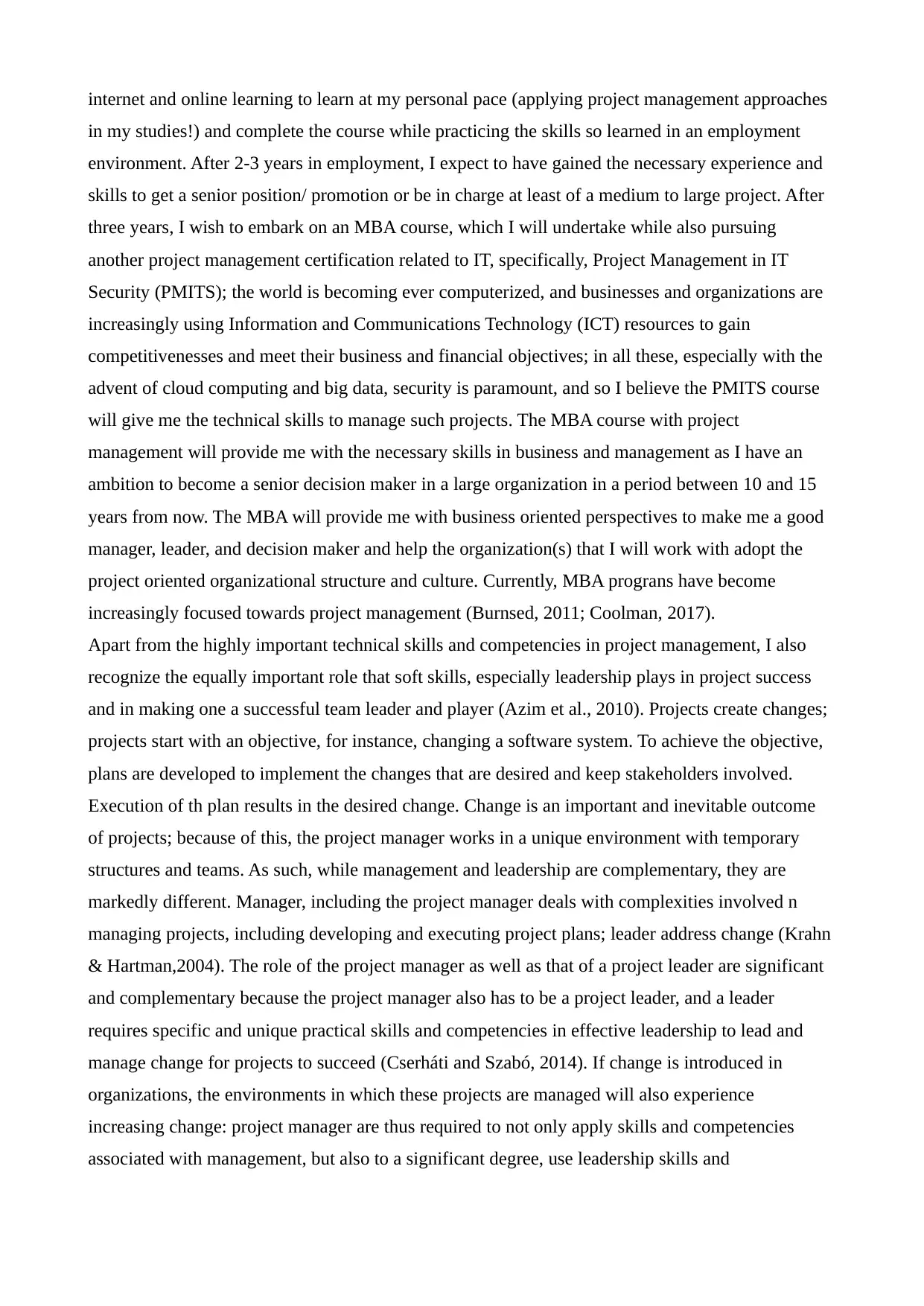
internet and online learning to learn at my personal pace (applying project management approaches
in my studies!) and complete the course while practicing the skills so learned in an employment
environment. After 2-3 years in employment, I expect to have gained the necessary experience and
skills to get a senior position/ promotion or be in charge at least of a medium to large project. After
three years, I wish to embark on an MBA course, which I will undertake while also pursuing
another project management certification related to IT, specifically, Project Management in IT
Security (PMITS); the world is becoming ever computerized, and businesses and organizations are
increasingly using Information and Communications Technology (ICT) resources to gain
competitivenesses and meet their business and financial objectives; in all these, especially with the
advent of cloud computing and big data, security is paramount, and so I believe the PMITS course
will give me the technical skills to manage such projects. The MBA course with project
management will provide me with the necessary skills in business and management as I have an
ambition to become a senior decision maker in a large organization in a period between 10 and 15
years from now. The MBA will provide me with business oriented perspectives to make me a good
manager, leader, and decision maker and help the organization(s) that I will work with adopt the
project oriented organizational structure and culture. Currently, MBA prograns have become
increasingly focused towards project management (Burnsed, 2011; Coolman, 2017).
Apart from the highly important technical skills and competencies in project management, I also
recognize the equally important role that soft skills, especially leadership plays in project success
and in making one a successful team leader and player (Azim et al., 2010). Projects create changes;
projects start with an objective, for instance, changing a software system. To achieve the objective,
plans are developed to implement the changes that are desired and keep stakeholders involved.
Execution of th plan results in the desired change. Change is an important and inevitable outcome
of projects; because of this, the project manager works in a unique environment with temporary
structures and teams. As such, while management and leadership are complementary, they are
markedly different. Manager, including the project manager deals with complexities involved n
managing projects, including developing and executing project plans; leader address change (Krahn
& Hartman,2004). The role of the project manager as well as that of a project leader are significant
and complementary because the project manager also has to be a project leader, and a leader
requires specific and unique practical skills and competencies in effective leadership to lead and
manage change for projects to succeed (Cserháti and Szabó, 2014). If change is introduced in
organizations, the environments in which these projects are managed will also experience
increasing change: project manager are thus required to not only apply skills and competencies
associated with management, but also to a significant degree, use leadership skills and
in my studies!) and complete the course while practicing the skills so learned in an employment
environment. After 2-3 years in employment, I expect to have gained the necessary experience and
skills to get a senior position/ promotion or be in charge at least of a medium to large project. After
three years, I wish to embark on an MBA course, which I will undertake while also pursuing
another project management certification related to IT, specifically, Project Management in IT
Security (PMITS); the world is becoming ever computerized, and businesses and organizations are
increasingly using Information and Communications Technology (ICT) resources to gain
competitivenesses and meet their business and financial objectives; in all these, especially with the
advent of cloud computing and big data, security is paramount, and so I believe the PMITS course
will give me the technical skills to manage such projects. The MBA course with project
management will provide me with the necessary skills in business and management as I have an
ambition to become a senior decision maker in a large organization in a period between 10 and 15
years from now. The MBA will provide me with business oriented perspectives to make me a good
manager, leader, and decision maker and help the organization(s) that I will work with adopt the
project oriented organizational structure and culture. Currently, MBA prograns have become
increasingly focused towards project management (Burnsed, 2011; Coolman, 2017).
Apart from the highly important technical skills and competencies in project management, I also
recognize the equally important role that soft skills, especially leadership plays in project success
and in making one a successful team leader and player (Azim et al., 2010). Projects create changes;
projects start with an objective, for instance, changing a software system. To achieve the objective,
plans are developed to implement the changes that are desired and keep stakeholders involved.
Execution of th plan results in the desired change. Change is an important and inevitable outcome
of projects; because of this, the project manager works in a unique environment with temporary
structures and teams. As such, while management and leadership are complementary, they are
markedly different. Manager, including the project manager deals with complexities involved n
managing projects, including developing and executing project plans; leader address change (Krahn
& Hartman,2004). The role of the project manager as well as that of a project leader are significant
and complementary because the project manager also has to be a project leader, and a leader
requires specific and unique practical skills and competencies in effective leadership to lead and
manage change for projects to succeed (Cserháti and Szabó, 2014). If change is introduced in
organizations, the environments in which these projects are managed will also experience
increasing change: project manager are thus required to not only apply skills and competencies
associated with management, but also to a significant degree, use leadership skills and
⊘ This is a preview!⊘
Do you want full access?
Subscribe today to unlock all pages.

Trusted by 1+ million students worldwide
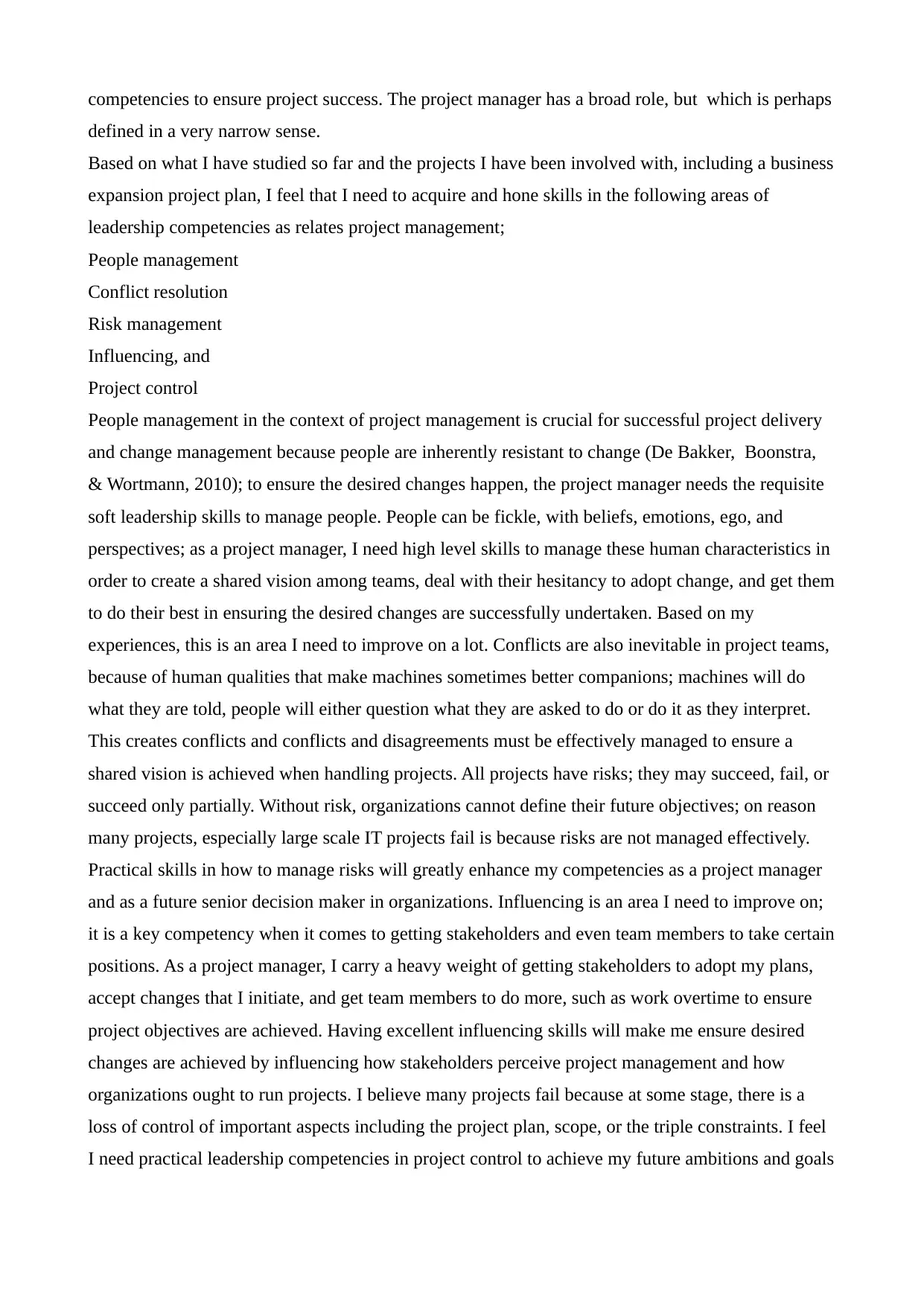
competencies to ensure project success. The project manager has a broad role, but which is perhaps
defined in a very narrow sense.
Based on what I have studied so far and the projects I have been involved with, including a business
expansion project plan, I feel that I need to acquire and hone skills in the following areas of
leadership competencies as relates project management;
People management
Conflict resolution
Risk management
Influencing, and
Project control
People management in the context of project management is crucial for successful project delivery
and change management because people are inherently resistant to change (De Bakker, Boonstra,
& Wortmann, 2010); to ensure the desired changes happen, the project manager needs the requisite
soft leadership skills to manage people. People can be fickle, with beliefs, emotions, ego, and
perspectives; as a project manager, I need high level skills to manage these human characteristics in
order to create a shared vision among teams, deal with their hesitancy to adopt change, and get them
to do their best in ensuring the desired changes are successfully undertaken. Based on my
experiences, this is an area I need to improve on a lot. Conflicts are also inevitable in project teams,
because of human qualities that make machines sometimes better companions; machines will do
what they are told, people will either question what they are asked to do or do it as they interpret.
This creates conflicts and conflicts and disagreements must be effectively managed to ensure a
shared vision is achieved when handling projects. All projects have risks; they may succeed, fail, or
succeed only partially. Without risk, organizations cannot define their future objectives; on reason
many projects, especially large scale IT projects fail is because risks are not managed effectively.
Practical skills in how to manage risks will greatly enhance my competencies as a project manager
and as a future senior decision maker in organizations. Influencing is an area I need to improve on;
it is a key competency when it comes to getting stakeholders and even team members to take certain
positions. As a project manager, I carry a heavy weight of getting stakeholders to adopt my plans,
accept changes that I initiate, and get team members to do more, such as work overtime to ensure
project objectives are achieved. Having excellent influencing skills will make me ensure desired
changes are achieved by influencing how stakeholders perceive project management and how
organizations ought to run projects. I believe many projects fail because at some stage, there is a
loss of control of important aspects including the project plan, scope, or the triple constraints. I feel
I need practical leadership competencies in project control to achieve my future ambitions and goals
defined in a very narrow sense.
Based on what I have studied so far and the projects I have been involved with, including a business
expansion project plan, I feel that I need to acquire and hone skills in the following areas of
leadership competencies as relates project management;
People management
Conflict resolution
Risk management
Influencing, and
Project control
People management in the context of project management is crucial for successful project delivery
and change management because people are inherently resistant to change (De Bakker, Boonstra,
& Wortmann, 2010); to ensure the desired changes happen, the project manager needs the requisite
soft leadership skills to manage people. People can be fickle, with beliefs, emotions, ego, and
perspectives; as a project manager, I need high level skills to manage these human characteristics in
order to create a shared vision among teams, deal with their hesitancy to adopt change, and get them
to do their best in ensuring the desired changes are successfully undertaken. Based on my
experiences, this is an area I need to improve on a lot. Conflicts are also inevitable in project teams,
because of human qualities that make machines sometimes better companions; machines will do
what they are told, people will either question what they are asked to do or do it as they interpret.
This creates conflicts and conflicts and disagreements must be effectively managed to ensure a
shared vision is achieved when handling projects. All projects have risks; they may succeed, fail, or
succeed only partially. Without risk, organizations cannot define their future objectives; on reason
many projects, especially large scale IT projects fail is because risks are not managed effectively.
Practical skills in how to manage risks will greatly enhance my competencies as a project manager
and as a future senior decision maker in organizations. Influencing is an area I need to improve on;
it is a key competency when it comes to getting stakeholders and even team members to take certain
positions. As a project manager, I carry a heavy weight of getting stakeholders to adopt my plans,
accept changes that I initiate, and get team members to do more, such as work overtime to ensure
project objectives are achieved. Having excellent influencing skills will make me ensure desired
changes are achieved by influencing how stakeholders perceive project management and how
organizations ought to run projects. I believe many projects fail because at some stage, there is a
loss of control of important aspects including the project plan, scope, or the triple constraints. I feel
I need practical leadership competencies in project control to achieve my future ambitions and goals
Paraphrase This Document
Need a fresh take? Get an instant paraphrase of this document with our AI Paraphraser
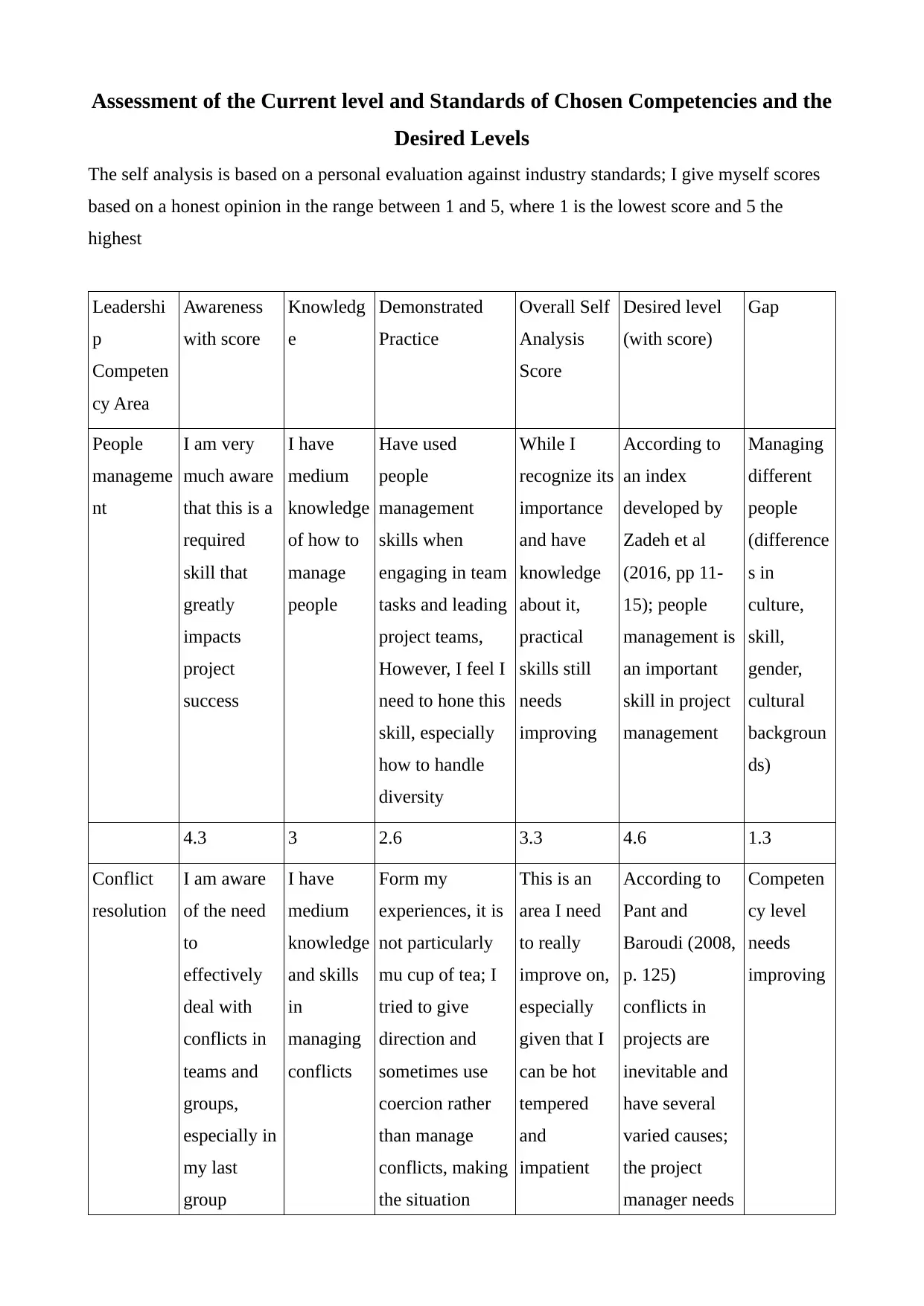
Assessment of the Current level and Standards of Chosen Competencies and the
Desired Levels
The self analysis is based on a personal evaluation against industry standards; I give myself scores
based on a honest opinion in the range between 1 and 5, where 1 is the lowest score and 5 the
highest
Leadershi
p
Competen
cy Area
Awareness
with score
Knowledg
e
Demonstrated
Practice
Overall Self
Analysis
Score
Desired level
(with score)
Gap
People
manageme
nt
I am very
much aware
that this is a
required
skill that
greatly
impacts
project
success
I have
medium
knowledge
of how to
manage
people
Have used
people
management
skills when
engaging in team
tasks and leading
project teams,
However, I feel I
need to hone this
skill, especially
how to handle
diversity
While I
recognize its
importance
and have
knowledge
about it,
practical
skills still
needs
improving
According to
an index
developed by
Zadeh et al
(2016, pp 11-
15); people
management is
an important
skill in project
management
Managing
different
people
(difference
s in
culture,
skill,
gender,
cultural
backgroun
ds)
4.3 3 2.6 3.3 4.6 1.3
Conflict
resolution
I am aware
of the need
to
effectively
deal with
conflicts in
teams and
groups,
especially in
my last
group
I have
medium
knowledge
and skills
in
managing
conflicts
Form my
experiences, it is
not particularly
mu cup of tea; I
tried to give
direction and
sometimes use
coercion rather
than manage
conflicts, making
the situation
This is an
area I need
to really
improve on,
especially
given that I
can be hot
tempered
and
impatient
According to
Pant and
Baroudi (2008,
p. 125)
conflicts in
projects are
inevitable and
have several
varied causes;
the project
manager needs
Competen
cy level
needs
improving
Desired Levels
The self analysis is based on a personal evaluation against industry standards; I give myself scores
based on a honest opinion in the range between 1 and 5, where 1 is the lowest score and 5 the
highest
Leadershi
p
Competen
cy Area
Awareness
with score
Knowledg
e
Demonstrated
Practice
Overall Self
Analysis
Score
Desired level
(with score)
Gap
People
manageme
nt
I am very
much aware
that this is a
required
skill that
greatly
impacts
project
success
I have
medium
knowledge
of how to
manage
people
Have used
people
management
skills when
engaging in team
tasks and leading
project teams,
However, I feel I
need to hone this
skill, especially
how to handle
diversity
While I
recognize its
importance
and have
knowledge
about it,
practical
skills still
needs
improving
According to
an index
developed by
Zadeh et al
(2016, pp 11-
15); people
management is
an important
skill in project
management
Managing
different
people
(difference
s in
culture,
skill,
gender,
cultural
backgroun
ds)
4.3 3 2.6 3.3 4.6 1.3
Conflict
resolution
I am aware
of the need
to
effectively
deal with
conflicts in
teams and
groups,
especially in
my last
group
I have
medium
knowledge
and skills
in
managing
conflicts
Form my
experiences, it is
not particularly
mu cup of tea; I
tried to give
direction and
sometimes use
coercion rather
than manage
conflicts, making
the situation
This is an
area I need
to really
improve on,
especially
given that I
can be hot
tempered
and
impatient
According to
Pant and
Baroudi (2008,
p. 125)
conflicts in
projects are
inevitable and
have several
varied causes;
the project
manager needs
Competen
cy level
needs
improving
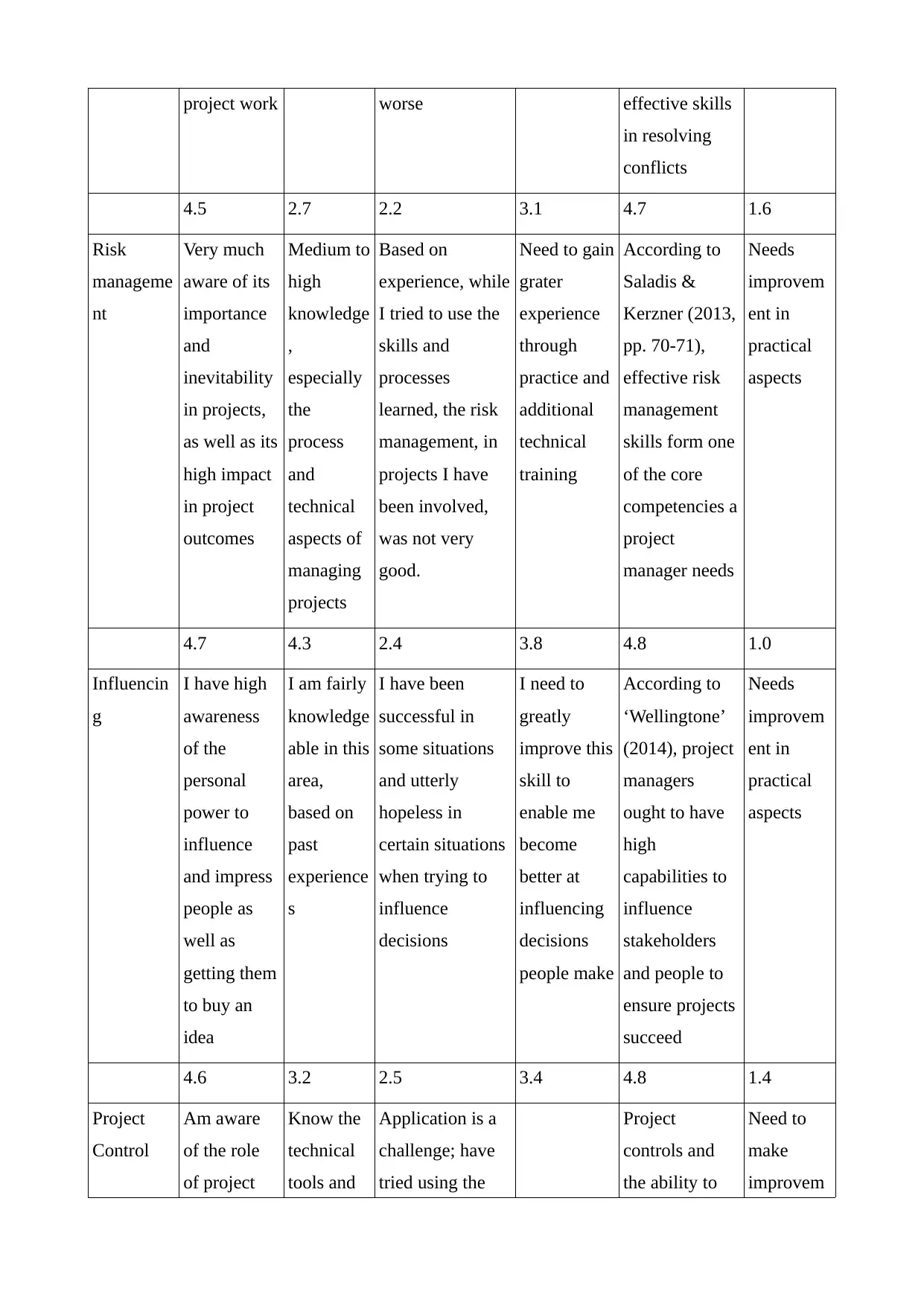
project work worse effective skills
in resolving
conflicts
4.5 2.7 2.2 3.1 4.7 1.6
Risk
manageme
nt
Very much
aware of its
importance
and
inevitability
in projects,
as well as its
high impact
in project
outcomes
Medium to
high
knowledge
,
especially
the
process
and
technical
aspects of
managing
projects
Based on
experience, while
I tried to use the
skills and
processes
learned, the risk
management, in
projects I have
been involved,
was not very
good.
Need to gain
grater
experience
through
practice and
additional
technical
training
According to
Saladis &
Kerzner (2013,
pp. 70-71),
effective risk
management
skills form one
of the core
competencies a
project
manager needs
Needs
improvem
ent in
practical
aspects
4.7 4.3 2.4 3.8 4.8 1.0
Influencin
g
I have high
awareness
of the
personal
power to
influence
and impress
people as
well as
getting them
to buy an
idea
I am fairly
knowledge
able in this
area,
based on
past
experience
s
I have been
successful in
some situations
and utterly
hopeless in
certain situations
when trying to
influence
decisions
I need to
greatly
improve this
skill to
enable me
become
better at
influencing
decisions
people make
According to
‘Wellingtone’
(2014), project
managers
ought to have
high
capabilities to
influence
stakeholders
and people to
ensure projects
succeed
Needs
improvem
ent in
practical
aspects
4.6 3.2 2.5 3.4 4.8 1.4
Project
Control
Am aware
of the role
of project
Know the
technical
tools and
Application is a
challenge; have
tried using the
Project
controls and
the ability to
Need to
make
improvem
in resolving
conflicts
4.5 2.7 2.2 3.1 4.7 1.6
Risk
manageme
nt
Very much
aware of its
importance
and
inevitability
in projects,
as well as its
high impact
in project
outcomes
Medium to
high
knowledge
,
especially
the
process
and
technical
aspects of
managing
projects
Based on
experience, while
I tried to use the
skills and
processes
learned, the risk
management, in
projects I have
been involved,
was not very
good.
Need to gain
grater
experience
through
practice and
additional
technical
training
According to
Saladis &
Kerzner (2013,
pp. 70-71),
effective risk
management
skills form one
of the core
competencies a
project
manager needs
Needs
improvem
ent in
practical
aspects
4.7 4.3 2.4 3.8 4.8 1.0
Influencin
g
I have high
awareness
of the
personal
power to
influence
and impress
people as
well as
getting them
to buy an
idea
I am fairly
knowledge
able in this
area,
based on
past
experience
s
I have been
successful in
some situations
and utterly
hopeless in
certain situations
when trying to
influence
decisions
I need to
greatly
improve this
skill to
enable me
become
better at
influencing
decisions
people make
According to
‘Wellingtone’
(2014), project
managers
ought to have
high
capabilities to
influence
stakeholders
and people to
ensure projects
succeed
Needs
improvem
ent in
practical
aspects
4.6 3.2 2.5 3.4 4.8 1.4
Project
Control
Am aware
of the role
of project
Know the
technical
tools and
Application is a
challenge; have
tried using the
Project
controls and
the ability to
Need to
make
improvem
⊘ This is a preview!⊘
Do you want full access?
Subscribe today to unlock all pages.

Trusted by 1+ million students worldwide
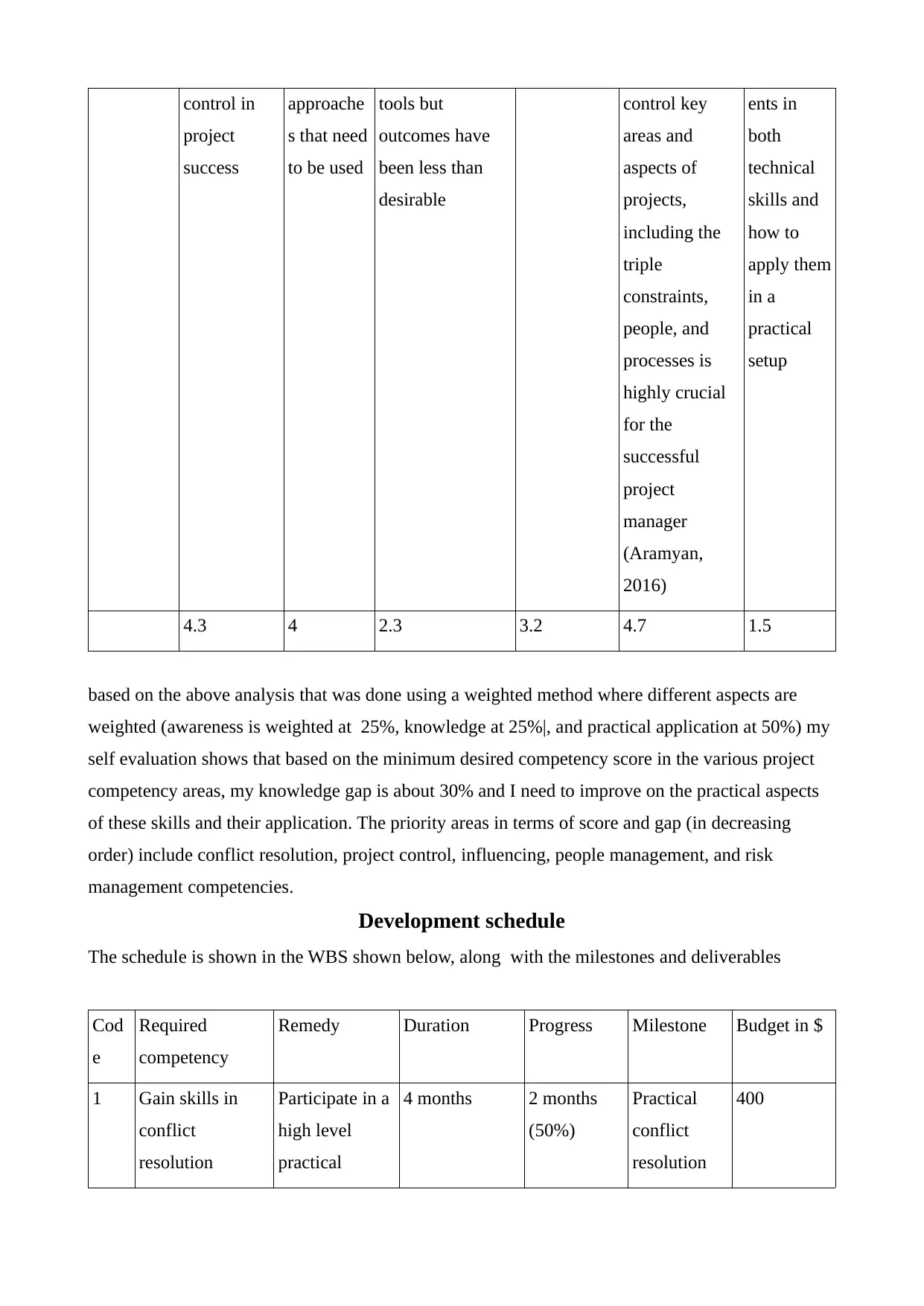
control in
project
success
approache
s that need
to be used
tools but
outcomes have
been less than
desirable
control key
areas and
aspects of
projects,
including the
triple
constraints,
people, and
processes is
highly crucial
for the
successful
project
manager
(Aramyan,
2016)
ents in
both
technical
skills and
how to
apply them
in a
practical
setup
4.3 4 2.3 3.2 4.7 1.5
based on the above analysis that was done using a weighted method where different aspects are
weighted (awareness is weighted at 25%, knowledge at 25%|, and practical application at 50%) my
self evaluation shows that based on the minimum desired competency score in the various project
competency areas, my knowledge gap is about 30% and I need to improve on the practical aspects
of these skills and their application. The priority areas in terms of score and gap (in decreasing
order) include conflict resolution, project control, influencing, people management, and risk
management competencies.
Development schedule
The schedule is shown in the WBS shown below, along with the milestones and deliverables
Cod
e
Required
competency
Remedy Duration Progress Milestone Budget in $
1 Gain skills in
conflict
resolution
Participate in a
high level
practical
4 months 2 months
(50%)
Practical
conflict
resolution
400
project
success
approache
s that need
to be used
tools but
outcomes have
been less than
desirable
control key
areas and
aspects of
projects,
including the
triple
constraints,
people, and
processes is
highly crucial
for the
successful
project
manager
(Aramyan,
2016)
ents in
both
technical
skills and
how to
apply them
in a
practical
setup
4.3 4 2.3 3.2 4.7 1.5
based on the above analysis that was done using a weighted method where different aspects are
weighted (awareness is weighted at 25%, knowledge at 25%|, and practical application at 50%) my
self evaluation shows that based on the minimum desired competency score in the various project
competency areas, my knowledge gap is about 30% and I need to improve on the practical aspects
of these skills and their application. The priority areas in terms of score and gap (in decreasing
order) include conflict resolution, project control, influencing, people management, and risk
management competencies.
Development schedule
The schedule is shown in the WBS shown below, along with the milestones and deliverables
Cod
e
Required
competency
Remedy Duration Progress Milestone Budget in $
1 Gain skills in
conflict
resolution
Participate in a
high level
practical
4 months 2 months
(50%)
Practical
conflict
resolution
400
Paraphrase This Document
Need a fresh take? Get an instant paraphrase of this document with our AI Paraphraser
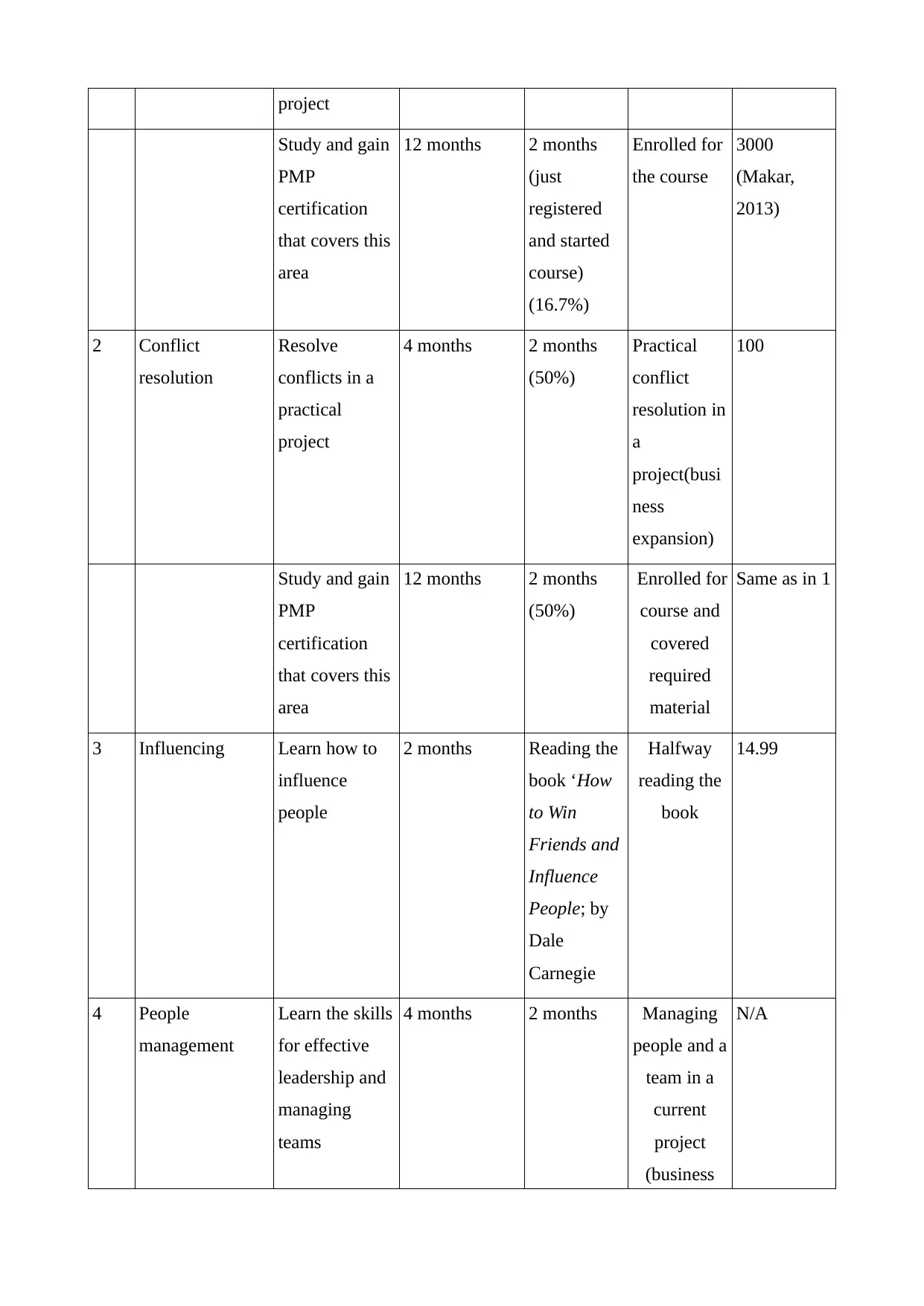
project
Study and gain
PMP
certification
that covers this
area
12 months 2 months
(just
registered
and started
course)
(16.7%)
Enrolled for
the course
3000
(Makar,
2013)
2 Conflict
resolution
Resolve
conflicts in a
practical
project
4 months 2 months
(50%)
Practical
conflict
resolution in
a
project(busi
ness
expansion)
100
Study and gain
PMP
certification
that covers this
area
12 months 2 months
(50%)
Enrolled for
course and
covered
required
material
Same as in 1
3 Influencing Learn how to
influence
people
2 months Reading the
book ‘How
to Win
Friends and
Influence
People; by
Dale
Carnegie
Halfway
reading the
book
14.99
4 People
management
Learn the skills
for effective
leadership and
managing
teams
4 months 2 months Managing
people and a
team in a
current
project
(business
N/A
Study and gain
PMP
certification
that covers this
area
12 months 2 months
(just
registered
and started
course)
(16.7%)
Enrolled for
the course
3000
(Makar,
2013)
2 Conflict
resolution
Resolve
conflicts in a
practical
project
4 months 2 months
(50%)
Practical
conflict
resolution in
a
project(busi
ness
expansion)
100
Study and gain
PMP
certification
that covers this
area
12 months 2 months
(50%)
Enrolled for
course and
covered
required
material
Same as in 1
3 Influencing Learn how to
influence
people
2 months Reading the
book ‘How
to Win
Friends and
Influence
People; by
Dale
Carnegie
Halfway
reading the
book
14.99
4 People
management
Learn the skills
for effective
leadership and
managing
teams
4 months 2 months Managing
people and a
team in a
current
project
(business
N/A
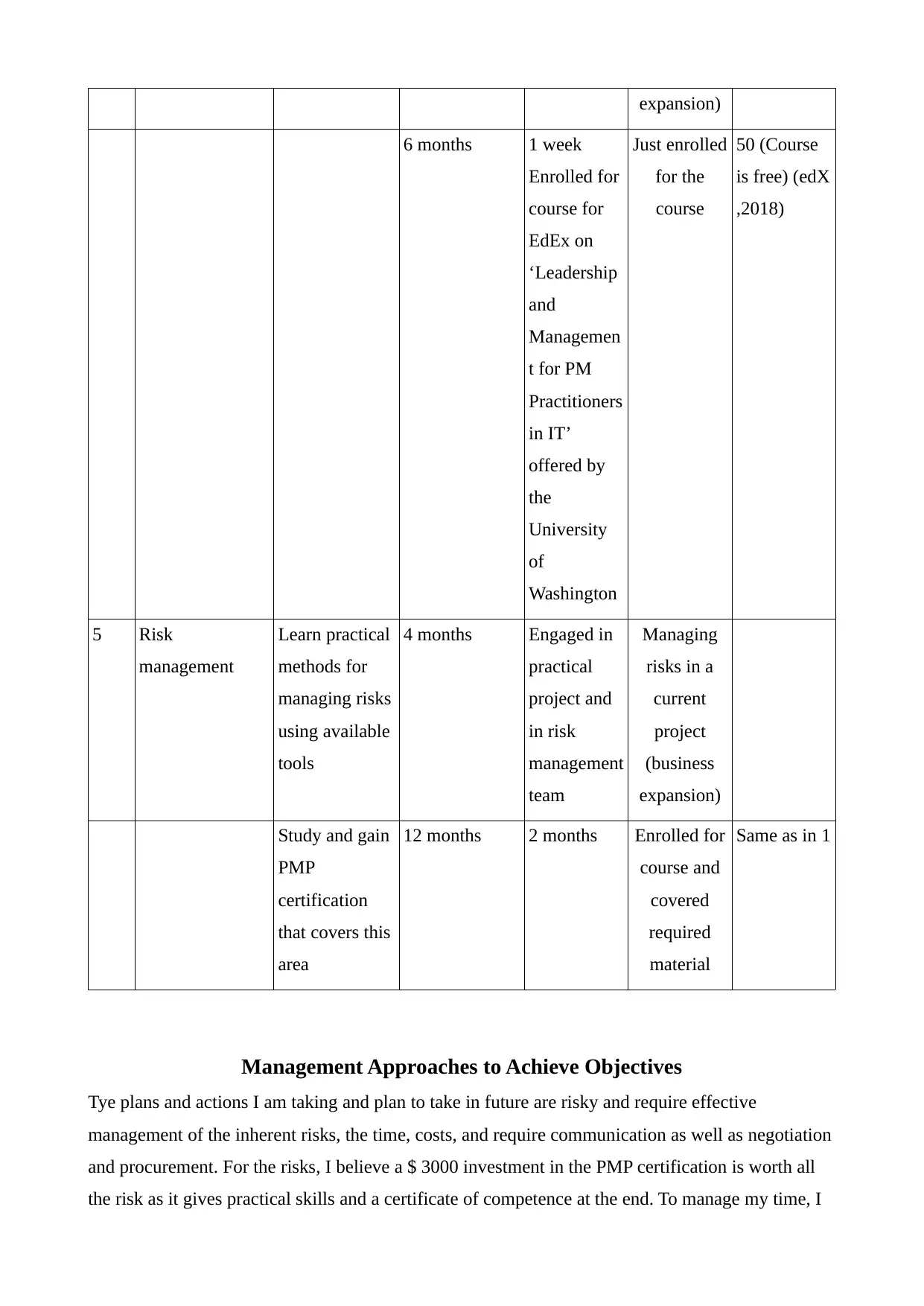
expansion)
6 months 1 week
Enrolled for
course for
EdEx on
‘Leadership
and
Managemen
t for PM
Practitioners
in IT’
offered by
the
University
of
Washington
Just enrolled
for the
course
50 (Course
is free) (edX
,2018)
5 Risk
management
Learn practical
methods for
managing risks
using available
tools
4 months Engaged in
practical
project and
in risk
management
team
Managing
risks in a
current
project
(business
expansion)
Study and gain
PMP
certification
that covers this
area
12 months 2 months Enrolled for
course and
covered
required
material
Same as in 1
Management Approaches to Achieve Objectives
Tye plans and actions I am taking and plan to take in future are risky and require effective
management of the inherent risks, the time, costs, and require communication as well as negotiation
and procurement. For the risks, I believe a $ 3000 investment in the PMP certification is worth all
the risk as it gives practical skills and a certificate of competence at the end. To manage my time, I
6 months 1 week
Enrolled for
course for
EdEx on
‘Leadership
and
Managemen
t for PM
Practitioners
in IT’
offered by
the
University
of
Washington
Just enrolled
for the
course
50 (Course
is free) (edX
,2018)
5 Risk
management
Learn practical
methods for
managing risks
using available
tools
4 months Engaged in
practical
project and
in risk
management
team
Managing
risks in a
current
project
(business
expansion)
Study and gain
PMP
certification
that covers this
area
12 months 2 months Enrolled for
course and
covered
required
material
Same as in 1
Management Approaches to Achieve Objectives
Tye plans and actions I am taking and plan to take in future are risky and require effective
management of the inherent risks, the time, costs, and require communication as well as negotiation
and procurement. For the risks, I believe a $ 3000 investment in the PMP certification is worth all
the risk as it gives practical skills and a certificate of competence at the end. To manage my time, I
⊘ This is a preview!⊘
Do you want full access?
Subscribe today to unlock all pages.

Trusted by 1+ million students worldwide
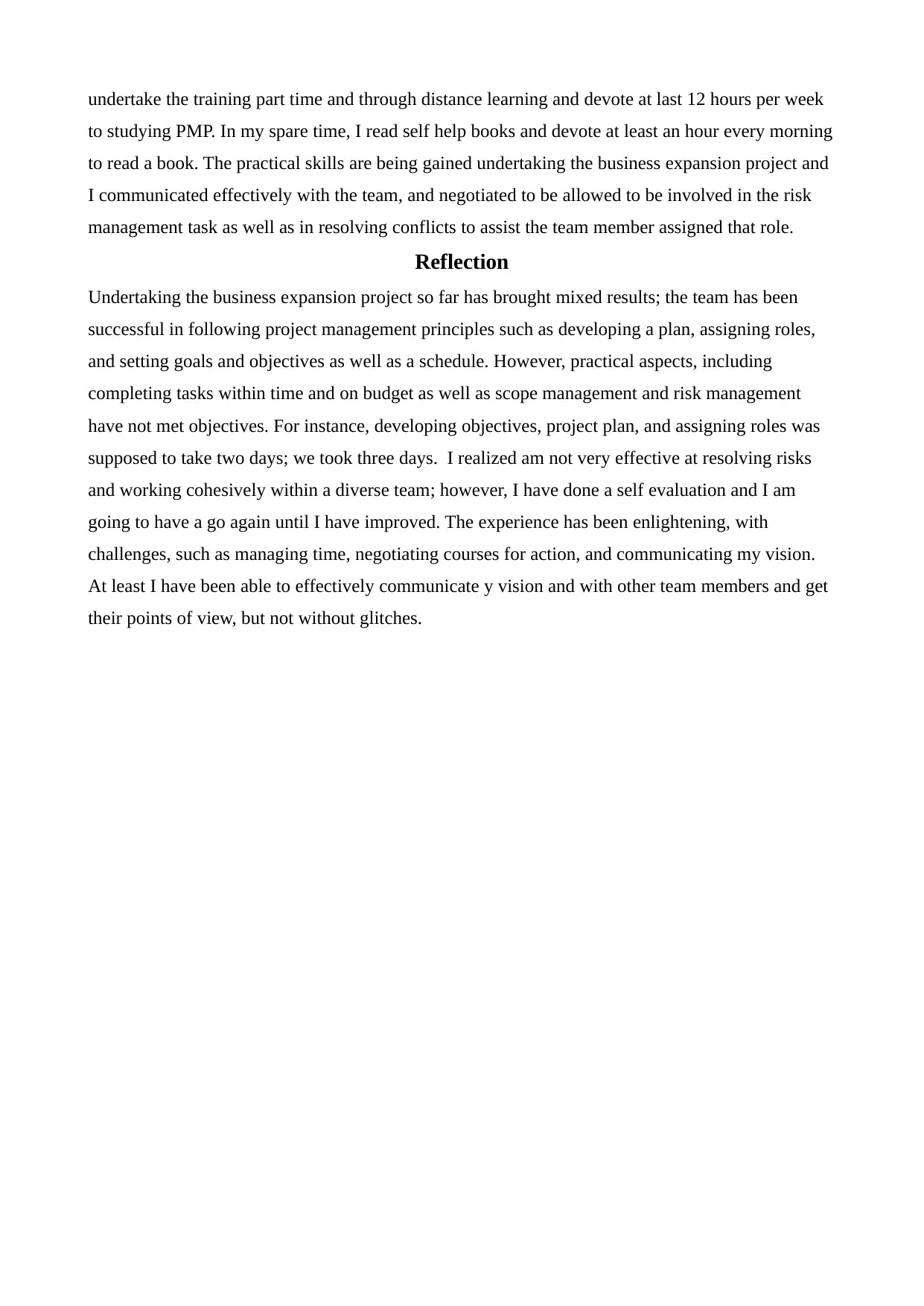
undertake the training part time and through distance learning and devote at last 12 hours per week
to studying PMP. In my spare time, I read self help books and devote at least an hour every morning
to read a book. The practical skills are being gained undertaking the business expansion project and
I communicated effectively with the team, and negotiated to be allowed to be involved in the risk
management task as well as in resolving conflicts to assist the team member assigned that role.
Reflection
Undertaking the business expansion project so far has brought mixed results; the team has been
successful in following project management principles such as developing a plan, assigning roles,
and setting goals and objectives as well as a schedule. However, practical aspects, including
completing tasks within time and on budget as well as scope management and risk management
have not met objectives. For instance, developing objectives, project plan, and assigning roles was
supposed to take two days; we took three days. I realized am not very effective at resolving risks
and working cohesively within a diverse team; however, I have done a self evaluation and I am
going to have a go again until I have improved. The experience has been enlightening, with
challenges, such as managing time, negotiating courses for action, and communicating my vision.
At least I have been able to effectively communicate y vision and with other team members and get
their points of view, but not without glitches.
to studying PMP. In my spare time, I read self help books and devote at least an hour every morning
to read a book. The practical skills are being gained undertaking the business expansion project and
I communicated effectively with the team, and negotiated to be allowed to be involved in the risk
management task as well as in resolving conflicts to assist the team member assigned that role.
Reflection
Undertaking the business expansion project so far has brought mixed results; the team has been
successful in following project management principles such as developing a plan, assigning roles,
and setting goals and objectives as well as a schedule. However, practical aspects, including
completing tasks within time and on budget as well as scope management and risk management
have not met objectives. For instance, developing objectives, project plan, and assigning roles was
supposed to take two days; we took three days. I realized am not very effective at resolving risks
and working cohesively within a diverse team; however, I have done a self evaluation and I am
going to have a go again until I have improved. The experience has been enlightening, with
challenges, such as managing time, negotiating courses for action, and communicating my vision.
At least I have been able to effectively communicate y vision and with other team members and get
their points of view, but not without glitches.
Paraphrase This Document
Need a fresh take? Get an instant paraphrase of this document with our AI Paraphraser
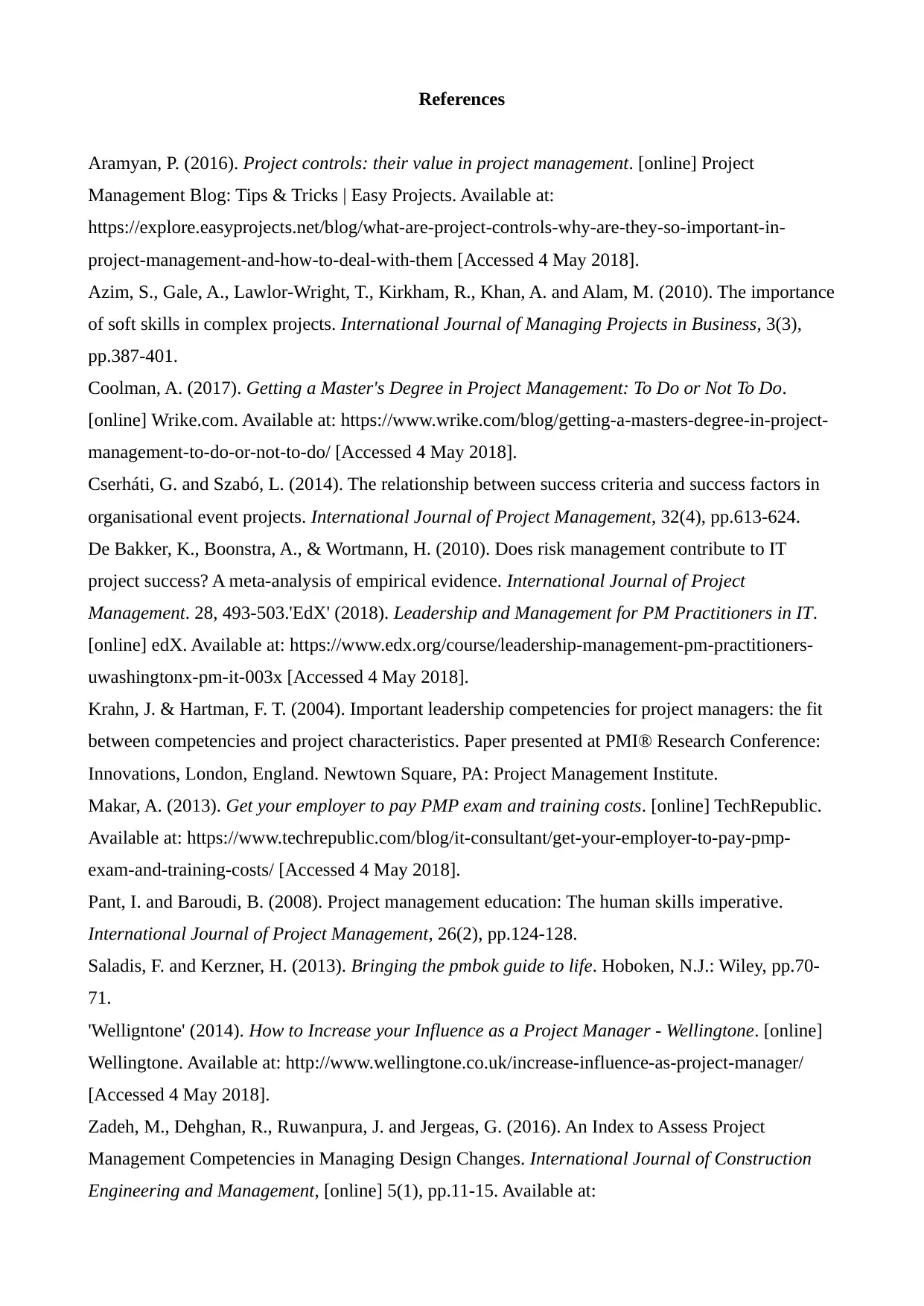
References
Aramyan, P. (2016). Project controls: their value in project management. [online] Project
Management Blog: Tips & Tricks | Easy Projects. Available at:
https://explore.easyprojects.net/blog/what-are-project-controls-why-are-they-so-important-in-
project-management-and-how-to-deal-with-them [Accessed 4 May 2018].
Azim, S., Gale, A., Lawlor‐Wright, T., Kirkham, R., Khan, A. and Alam, M. (2010). The importance
of soft skills in complex projects. International Journal of Managing Projects in Business, 3(3),
pp.387-401.
Coolman, A. (2017). Getting a Master's Degree in Project Management: To Do or Not To Do.
[online] Wrike.com. Available at: https://www.wrike.com/blog/getting-a-masters-degree-in-project-
management-to-do-or-not-to-do/ [Accessed 4 May 2018].
Cserháti, G. and Szabó, L. (2014). The relationship between success criteria and success factors in
organisational event projects. International Journal of Project Management, 32(4), pp.613-624.
De Bakker, K., Boonstra, A., & Wortmann, H. (2010). Does risk management contribute to IT
project success? A meta-analysis of empirical evidence. International Journal of Project
Management. 28, 493-503.'EdX' (2018). Leadership and Management for PM Practitioners in IT.
[online] edX. Available at: https://www.edx.org/course/leadership-management-pm-practitioners-
uwashingtonx-pm-it-003x [Accessed 4 May 2018].
Krahn, J. & Hartman, F. T. (2004). Important leadership competencies for project managers: the fit
between competencies and project characteristics. Paper presented at PMI® Research Conference:
Innovations, London, England. Newtown Square, PA: Project Management Institute.
Makar, A. (2013). Get your employer to pay PMP exam and training costs. [online] TechRepublic.
Available at: https://www.techrepublic.com/blog/it-consultant/get-your-employer-to-pay-pmp-
exam-and-training-costs/ [Accessed 4 May 2018].
Pant, I. and Baroudi, B. (2008). Project management education: The human skills imperative.
International Journal of Project Management, 26(2), pp.124-128.
Saladis, F. and Kerzner, H. (2013). Bringing the pmbok guide to life. Hoboken, N.J.: Wiley, pp.70-
71.
'Welligntone' (2014). How to Increase your Influence as a Project Manager - Wellingtone. [online]
Wellingtone. Available at: http://www.wellingtone.co.uk/increase-influence-as-project-manager/
[Accessed 4 May 2018].
Zadeh, M., Dehghan, R., Ruwanpura, J. and Jergeas, G. (2016). An Index to Assess Project
Management Competencies in Managing Design Changes. International Journal of Construction
Engineering and Management, [online] 5(1), pp.11-15. Available at:
Aramyan, P. (2016). Project controls: their value in project management. [online] Project
Management Blog: Tips & Tricks | Easy Projects. Available at:
https://explore.easyprojects.net/blog/what-are-project-controls-why-are-they-so-important-in-
project-management-and-how-to-deal-with-them [Accessed 4 May 2018].
Azim, S., Gale, A., Lawlor‐Wright, T., Kirkham, R., Khan, A. and Alam, M. (2010). The importance
of soft skills in complex projects. International Journal of Managing Projects in Business, 3(3),
pp.387-401.
Coolman, A. (2017). Getting a Master's Degree in Project Management: To Do or Not To Do.
[online] Wrike.com. Available at: https://www.wrike.com/blog/getting-a-masters-degree-in-project-
management-to-do-or-not-to-do/ [Accessed 4 May 2018].
Cserháti, G. and Szabó, L. (2014). The relationship between success criteria and success factors in
organisational event projects. International Journal of Project Management, 32(4), pp.613-624.
De Bakker, K., Boonstra, A., & Wortmann, H. (2010). Does risk management contribute to IT
project success? A meta-analysis of empirical evidence. International Journal of Project
Management. 28, 493-503.'EdX' (2018). Leadership and Management for PM Practitioners in IT.
[online] edX. Available at: https://www.edx.org/course/leadership-management-pm-practitioners-
uwashingtonx-pm-it-003x [Accessed 4 May 2018].
Krahn, J. & Hartman, F. T. (2004). Important leadership competencies for project managers: the fit
between competencies and project characteristics. Paper presented at PMI® Research Conference:
Innovations, London, England. Newtown Square, PA: Project Management Institute.
Makar, A. (2013). Get your employer to pay PMP exam and training costs. [online] TechRepublic.
Available at: https://www.techrepublic.com/blog/it-consultant/get-your-employer-to-pay-pmp-
exam-and-training-costs/ [Accessed 4 May 2018].
Pant, I. and Baroudi, B. (2008). Project management education: The human skills imperative.
International Journal of Project Management, 26(2), pp.124-128.
Saladis, F. and Kerzner, H. (2013). Bringing the pmbok guide to life. Hoboken, N.J.: Wiley, pp.70-
71.
'Welligntone' (2014). How to Increase your Influence as a Project Manager - Wellingtone. [online]
Wellingtone. Available at: http://www.wellingtone.co.uk/increase-influence-as-project-manager/
[Accessed 4 May 2018].
Zadeh, M., Dehghan, R., Ruwanpura, J. and Jergeas, G. (2016). An Index to Assess Project
Management Competencies in Managing Design Changes. International Journal of Construction
Engineering and Management, [online] 5(1), pp.11-15. Available at:

https://www.researchgate.net/publication/304498199_An_Index_to_Assess_Project_Management_
Competencies_in_Managing_Design_Changes [Accessed 4 May 2018].
Competencies_in_Managing_Design_Changes [Accessed 4 May 2018].
⊘ This is a preview!⊘
Do you want full access?
Subscribe today to unlock all pages.

Trusted by 1+ million students worldwide
1 out of 12
Related Documents
Your All-in-One AI-Powered Toolkit for Academic Success.
+13062052269
info@desklib.com
Available 24*7 on WhatsApp / Email
![[object Object]](/_next/static/media/star-bottom.7253800d.svg)
Unlock your academic potential
Copyright © 2020–2025 A2Z Services. All Rights Reserved. Developed and managed by ZUCOL.





